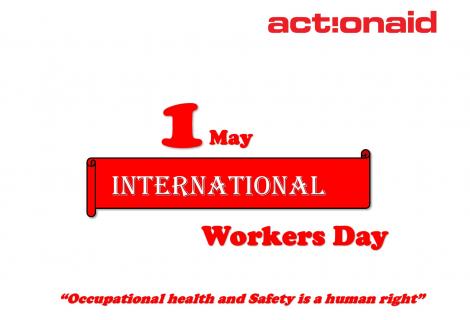ActionAid Zimbabwe urges the Government to prioritize smallholder investment and ensure decent working conditions for agriculture sector workers

Workers Day Commemoration 2022 Press Release
Harare - 1 May 2022 – ActionAid Zimbabwe (AAZ) joins the rest of the world in commemorating International Workers’ Day. Observed annually on the first of May, the day is a celebration of achievements of the labour movement. This year’s celebrations are running under the theme, “occupational health and safety is a human right,” and on this day, AAZ calls upon the government to prioritise the attainment of decent work in Zimbabwe through upholding of workers’ rights, strengthening of social protection measures and an acceptable living wage.
In Zimbabwe, wages, incomes inequalities and workers’ rights violations have grown tremendously over the years especially in the wake of the COVID-19 pandemic. The past 5 years have presented smallholder farmers in Zimbabwe majority of whom are women, with multiple shocks and stressors ranging from climatic, economic, biological to health related. For communities living in marginalized areas who already have their livelihoods compromised, their ability to deal with and recover from such shocks and stressors in a manner that does not disadvantage or have negative consequences on their wellbeing or functioning becomes one of utmost importance to policy makers and duty bearers.
Household and community responses to the different types of shocks and stressors relies heavily on access to relevant and quality information especially with the recent shift from only a drought dominated shock landscape to include excessive rains that destroy property, sweep away livestock and people, erode soils, waterlog fields, and destroy productive assets meant to sustain smallholder’s livelihoods. Resilience, looking at a systems level, focusing on institutions responsible for implementing policies and sustaining systems that support a sector that contributes 17% to the national Gross Domestic Product (GDP), as we are celebrating Worker’s Day, should be prioritized if serious progressive steps are to be achieved. Agriculture as the main source of livelihood for most of the population requires concerted effort since its performance is a key determinant of rural livelihood resilience and poverty levels.
Currently the agricultural extension system has approximately one extension officer per 800 smallholder farmers thereby making it difficult for them to pay close attention to the needs of the individual farmer. In addition, the officers are ill-equipped, and hamstrung by inadequate budget allocations. Over reliance on development partners to support roll out of information, communication technologies to e-extension affects sustainability of these initiatives especially for early warning systems. AAZ notes that in remote and marginalized areas of the country, limited investment in infrastructure that supports communication at a wider scale and unreliable powering of the same has weakened these initiatives at the expense of smallholder farmers.
With the fast-paced nature on how hazards, shocks and stressors are evolving due to climate crises globally, adoption of leaner and effective extension systems cannot be over emphasized. This should not be limited only to financial related incentives but must be extended to other facets that will provide for decent working conditions for extension officers which is central to gender equality and women smallholder farmers’ empowerment.
Recommendations
While recent government initiatives targeting this critical service are commendable, AAZ calls upon the Zimbabwean Government to:
1. Increase budgetary allocation to Ministry of Lands, Agriculture, Fisheries, Water, Climate and Rural Development to fulfill the Malabo declaration with 10% of the budget allocated towards the smallholder sector. The Malabo declaration is a commitment to the Comprehensive Africa Agriculture Development (CAADP) principles to end hunger and emphasized by the United Nations Sustainable Development Goal 2 of zero hunger by 2030 and the African Union Vision 2030.
2. Decentralize budgetary utilization to provincial structures for the motorization and equipping of extension officers to adopt e-extension.
3. Facilitate investment of communication related infrastructure by private sector players that will have multiple use but contributing effectively to access to early warning information for effective decision making at smallholder level.
4. Support in-house training for front line staff on disaster risk management and development of mitigatory measures for the benefit of smallholder farmers.
5. Linked to 4 above, ensure that the Agro-ecology policy is finalised and adequate resources for its roll out have been allocated. 6. Extend National Social Security Authority (NSSA) schemes to cover informal economy workers and domestic workers.
//Ends/ For further comments and inquiries please contact us on the details below:
ActionAid Zimbabwe Country Director, Joy Mabenge: Email joy.mabenge@actionaid.org or Mobile +263 772904479 Twitter: https://twitter.com/ActionAidZim Facebook: https://www.facebook.com/ActionAidZimbabwe Website: https://zimbabwe.actionaid.org